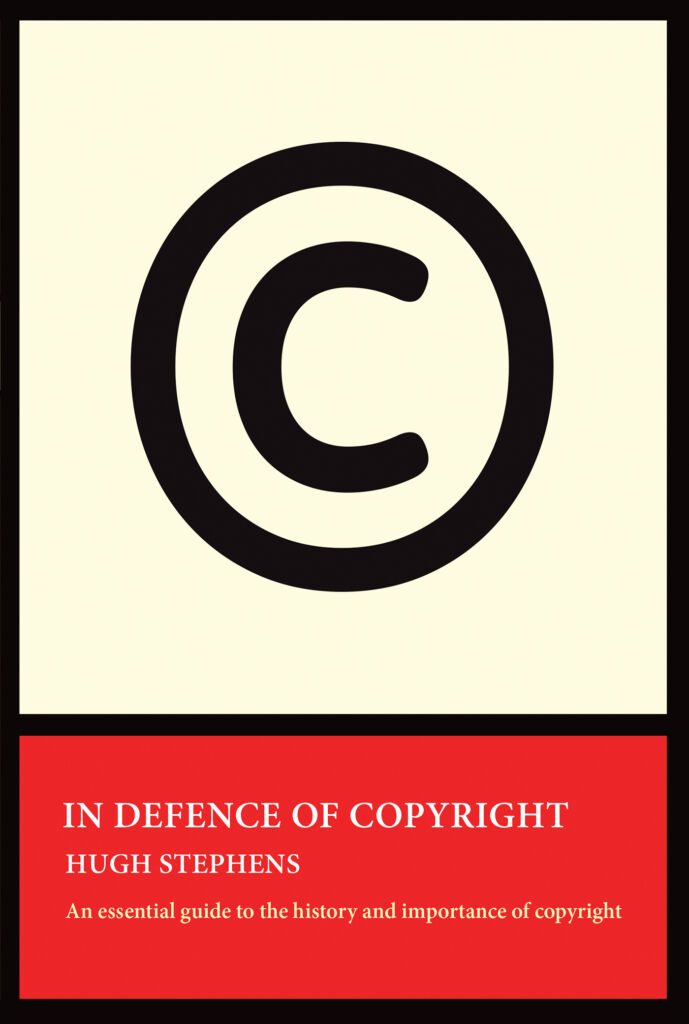A welcome and necessary defence
In Defence of Copyright: An essential guide to the history and importance of copyright
by Hugh Stephens
Toronto: Cormorant Books, 2023
$19.95 / 9781770866799
Reviewed by John Degen
*

Hugh Stephens is a respected thought-leader on the needlessly thorny topic of protection for cultural creation and intellectual property in Canada. That’s a fancy way of saying he knows a lot about copyright law. He writes a popular blog on the subject using the knowledge he gained from long business practice and scholarship in the field, and he is a refreshing voice of reason in a too-often malign public discourse. If you have anything to do with copyright law in Canada, you read Hugh Stephens… or you should.
This is where I have to make a brief disclosure. I also know a lot about copyright, though my knowledge comes mainly from a mad scramble to protect authors’ rights in the courts and legislatures of this land. I head up the staff at The Writers’ Union of Canada, and have been professionally engaged in Canada’s “copyfight” for more than twenty years. I regularly read Stephens’ Insights on International Copyright Issues, and almost always agree with those insights.
On the other hand, my philosophical alignment with Stephens’ weekly columns will not stop me from critiquing this book. Long experience in the field has taught me it’s impossible to find perfect agreement on any issue touching copyright and the cultural labour it is meant to protect. While I find Stephens understands the complex history and ongoing evolution of copyright law much as I do — that properly enacted, amended, and regulated, it “exists not just for the immediate benefit of the creator but more widely for the benefit of society” — his book contains far too little swearing to really capture the excruciating experience of battling the ignorance, organized disinformation, and fear-mongering in populist anti-copyright theory, of which there is plenty enough, unfairly influencing policy in Canada.
Let me be clearer in my assessment. This book is filled with important information and excellent insights. The author’s takes on how we should think about copyright are, to my mind, the best and proper takes. It’s a great read and a helpful resource. You should buy it… please don’t illegally download it.
I might quibble here and there.
In a section on Napster and other early music piracy platforms, Stephens writes “in the end the music industry was rescued by new technology and new music offerings.” Well… really? Rescued? Napster, Grokster, et al were merciless bulldozers tearing through the delicate fabric of the music economy, and a great deal of that damage remains unrepaired. Sure, Beyonce, Taylor Swift, and large record labels are doing fine now, but a closer look at the broader music industry shows an ugly hollowing out of the creative middle class. The rise of legal streaming has done less rescuing than it has concentrating of wealth and homogenizing of sound. It is inarguably more difficult today to make one’s living as a professional musician than it was before Napster took its big, failed home run cut on the early internet.
Early on, Stephens notes:
There are deep knowledge gaps and a prevailing impression that anything available on the internet is effectively free for the taking. If it isn’t free, the view is that it should be and that copyright is not just a barrier but the barrier preventing this. Ask many librarians — who should know better — and they will say that copyright locks up content and stops it from being made available to the public.
I would argue the mistaken librarians and widespread knowledge gaps are no accident. They are the result of a couple of decades of incessant, behind-the-scenes lobbying in Ottawa, tilting the entire discussion away from the rights of authors and toward a selfish market preference for free stuff. That campaign has been cynical, deceptive and, I believe, actively supported by the mercenary profit drive of US Big Tech.

I know Stephens is aware of the mudpit level of debate in Canada, and I suppose ultimately I’m glad he’s too gentlemanly and professional to bring that into this book. He’s setting the tone for debate on copyright where it should be, rather than where it has been for a couple of decades. I note, in fact, he does not once mention the name of Canada’s most prolific slinger of garbage rhetoric aimed at damaging strong copyright, nor does that “scholar” appear anywhere in the Selected Readings and References that close out this book.
Fair enough. Cultural workers and creative professionals all wish the self-defeating fashion of anti-copyright theory had never taken hold in Canada’s academy. We rue that it has clearly swayed policymakers in Ottawa, select Parliamentarians, and even Justices at the Supreme Court, into an ideological “users rights” boondoggle that’s done untold damage to Canadian culture, and installed money siphons from Ottawa straight to Silicon Valley.
Yet here we are. Stephens writes that Canadian “court interpretations have undermined much of the economic incentive for authors and publishers.” Indeed, they have, to the tune of over $200 million in lost revenues over the last dozen years. He’s absolutely correct when he writes “If a country values its literary tradition… it will honour and respect copyright.” But sadly, that does not describe Canada today.
A minor theme running through the book is that Canada has fallen behind other advanced economies in the robust protection of its cultural workers and their professional product. I would argue the situation on the ground here is much worse than just falling behind. Canada is a global embarrassment. We’re so far back in the race to encourage a working cultural economy, we may be in violation of international treaties, and we certainly can’t honour our many reciprocal agreements with copyright collecting societies oversees, who expect their artists to be protected here as ours are protected there.
One of my volunteer jobs is as Chair of the International Authors Forum, an artists’ rights umbrella organization headquartered in the UK. The IAF lobbies and advocates globally for authors’ rights under copyright and contract law. I’ve done this work for a decade around the world, and almost every talk I give begins with a very Canadian apology. Sorry about our broken Copyright Act; but, perhaps there are some lessons for your country in Canada’s failure. We are the example of what not to do if you want to encourage a vital national literature.
In Defence of Copyright touches on all the greatest hits of the contemporary copyfight. We learn about the much-misunderstood 1710 Statute of Anne, the modern world’s first written copyright law, and how it laid a respectful foundation for the evolving rights of cultural workers. There is of course Napster and the Pirate Bay, technical protection measures and the Google Books lawsuit. And no consideration of the topic would be complete without mention of Mickey Mouse, and the really quite silly fuss over copyright term extensions. Stephens cuts through the ridiculous in all that to get to the sublime.
The very personal author’s dedication at the front of the book is instructive. In thanking his family for support, freedom, and inspiration, Stephens reveals an artist’s soul — esteeming and respecting the contributions, goals, and work of those around him as he sets off on his own creativity. These values, I believe, inform strong copyright as well. To me that makes Stephens an honourable author with a very good book.
But he really should swear more. It’s cathartic.
*

John Degen is a poet and novelist with three published books and work in several anthologies. His debut novel, The Uninvited Guest, was shortlisted for the 2006 Amazon.ca First Novel Award. His essays and opinions have been published widely. He has served on many boards and advisories in the literary and arts sector including terms as Chair of the Book & Periodical Council, THIS Magazine and the Canadian Creators’ Coalition. He holds a Masters Degree in Literature from the University of Toronto.
Degen has worked on behalf of other authors for over twenty years. He is CEO of The Writers’ Union of Canada (TWUC), and Chair of the International Authors Forum (IAF) in the UK. He lives, works, and swims (six months of the year) in Northern Ontario.
*
The British Columbia Review
Interim Editors, 2023-25: Trevor Marc Hughes (non-fiction), Brett Josef Grubisic (fiction)
Publisher: Richard Mackie
Formerly The Ormsby Review, The British Columbia Review is an online book review and journal service for BC writers and readers. The Advisory Board now consists of Jean Barman, Wade Davis, Robin Fisher, Barry Gough, Hugh Johnston, Kathy Mezei, Patricia Roy, Maria Tippett, and Graeme Wynn. Provincial Government Patron (since September 2018): Creative BC. Honorary Patron: Yosef Wosk. Scholarly Patron: SFU Graduate Liberal Studies. The British Columbia Review was founded in 2016 by Richard Mackie and Alan Twigg.
“Only connect.” – E.M. Forster